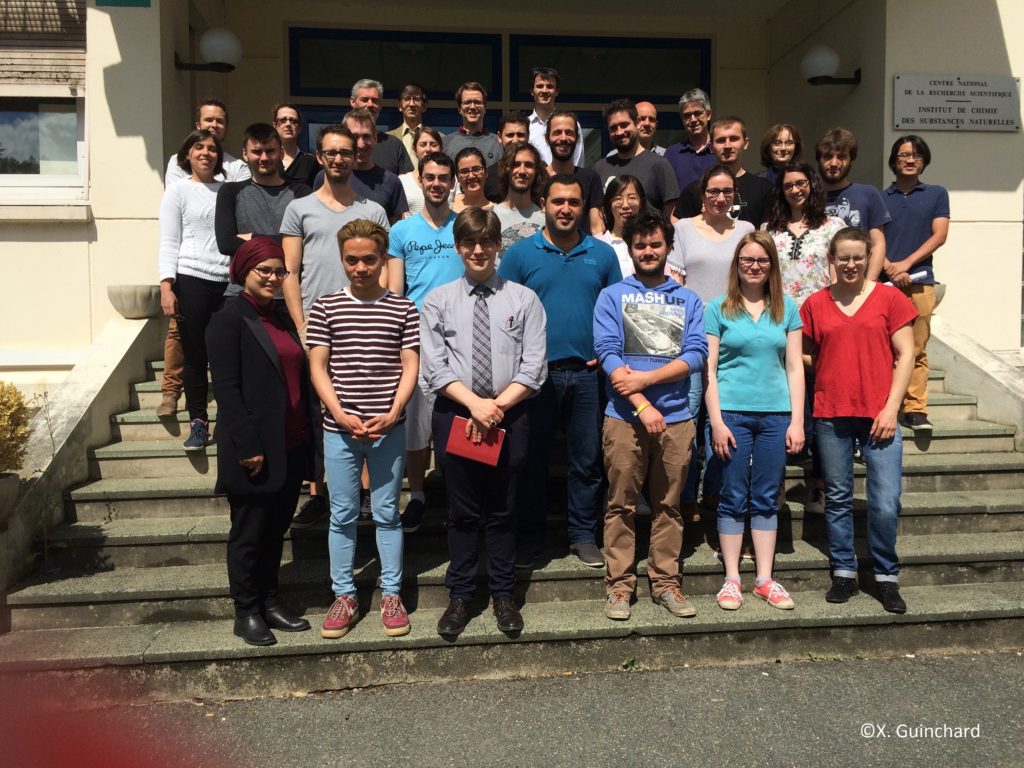Departement presentation
The Organic Synthesis and Catalytic Methods Department aims at developing fundamental research in organic synthesis. The department includes several principal research axis:
- The development of new methodologies and synthetic tools.
- The discovery of new reactions in an efficient manner and lower in energy costs.
- The development of new reactants and original catalysts aiming at more chemo- and stereoselectivities.
- The application of these tools in the synthesis of natural or bioactive products.
Permanent staff
 Géraldine Masson received her PhD (2003) in organic chemistry at the Joseph Fourier University, Grenoble (France), with Dr. Sandrine Py and Prof. Yannick Vallée. In the years 2003-2005 she was a Marie Curie postdoctoral research fellow with Prof. Jan van Maarseveen and Prof. Henk Hiemstra at the University of Amsterdam (Holland). In 2005 she joined the research group of Pr. Jieping Zhu at the Institut de Chimie des Substances Naturelles (ICSN) as a CNRS researcher, before initiating her independent career in 2011. Her research interests include the development of new organocatalytic enantioselective reactions and novel synthetic methodologies, and photoredox catalysis.
Géraldine Masson received her PhD (2003) in organic chemistry at the Joseph Fourier University, Grenoble (France), with Dr. Sandrine Py and Prof. Yannick Vallée. In the years 2003-2005 she was a Marie Curie postdoctoral research fellow with Prof. Jan van Maarseveen and Prof. Henk Hiemstra at the University of Amsterdam (Holland). In 2005 she joined the research group of Pr. Jieping Zhu at the Institut de Chimie des Substances Naturelles (ICSN) as a CNRS researcher, before initiating her independent career in 2011. Her research interests include the development of new organocatalytic enantioselective reactions and novel synthetic methodologies, and photoredox catalysis.
 Angela Marinetti is currently Directeur de Recherche at the CNRS. Her research interests lie in the area of phosphorus chemistry and organometallic catalysis.
Angela Marinetti is currently Directeur de Recherche at the CNRS. Her research interests lie in the area of phosphorus chemistry and organometallic catalysis.
 Philippe Dauban Igraduated from the Ecole Supérieure de Chimie Industrielle de Lyon in 1991. During the course of his studies in Lyon, he spent one year attending Salford University (United Kingdom) and working in industry (Orkem-Norsolor). He then received his PhD from the Université Paris XI in 1996, by working under the direction of Dr Robert Dodd (ICSN, Gif-sur-Yvette). After postdoctoral studies with Professor Jean-Claude Fiaud as a Rhône-Poulenc fellow, he obtained a permanent position at the Institut de Chimie des Substances Naturelles where he was named CNRS Research Director (2008). Outside the laboratory, he strongly enjoys playing soccer (being a die-hard fan of Saint-Etienne) and rugby. As he grows older, he is now more involved in “quille aveyronnaise ».
Philippe Dauban Igraduated from the Ecole Supérieure de Chimie Industrielle de Lyon in 1991. During the course of his studies in Lyon, he spent one year attending Salford University (United Kingdom) and working in industry (Orkem-Norsolor). He then received his PhD from the Université Paris XI in 1996, by working under the direction of Dr Robert Dodd (ICSN, Gif-sur-Yvette). After postdoctoral studies with Professor Jean-Claude Fiaud as a Rhône-Poulenc fellow, he obtained a permanent position at the Institut de Chimie des Substances Naturelles where he was named CNRS Research Director (2008). Outside the laboratory, he strongly enjoys playing soccer (being a die-hard fan of Saint-Etienne) and rugby. As he grows older, he is now more involved in “quille aveyronnaise ».
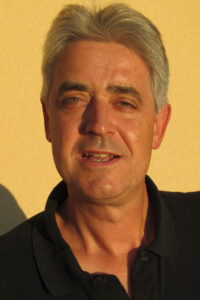 Jean-François Betzer received a chemical engineering degree from the Ecole Nationale Supérieure de Chimie de Paris in 1994 and a PhD degree under the direction of Prof. Jean-Yves Lallemand at the Ecole Polytechnique. After a post-doctoral training in the group of Prof. L. Ghosez, he was appointed at the CNRS as a Chargé de Recherche in the group of Prof. J. Ardisson and Dr. A. Pancrazi (Cergy-Pontoise, France). He joined the ICSN in 2007.
Jean-François Betzer received a chemical engineering degree from the Ecole Nationale Supérieure de Chimie de Paris in 1994 and a PhD degree under the direction of Prof. Jean-Yves Lallemand at the Ecole Polytechnique. After a post-doctoral training in the group of Prof. L. Ghosez, he was appointed at the CNRS as a Chargé de Recherche in the group of Prof. J. Ardisson and Dr. A. Pancrazi (Cergy-Pontoise, France). He joined the ICSN in 2007.
 Luc Neuville received his PhD in Organic Chemistry from the University Paris-Sud XI (Orsay) in 1999, preforming his research under the guidance of Professor Jieping Zhu at the Institut de Chimie des Substances Naturelles (Gif-sur-Yvette). From 1999 to 2001, he could appreciate Corn fields working Professor Scott E. Denmark as Post-doctoral Associate in Illinois (University of Illinois at Urbana-Champain, Champain-urbana, USA). In 2001, he was appointed as CNRS Chargé de Recherche, joining the group of Professor Nicole Moreau (Ecole National de Chimie Paris, Paris). He return to the ICSN in 2005, where he his holding a position of CNRS Research Director since 2013. Besides research, Luc is the happy father of two -lovely in his mind- daughters. He dislike particularly sport, but enjoys making fun about it around a drink and a good meal with friends.
Luc Neuville received his PhD in Organic Chemistry from the University Paris-Sud XI (Orsay) in 1999, preforming his research under the guidance of Professor Jieping Zhu at the Institut de Chimie des Substances Naturelles (Gif-sur-Yvette). From 1999 to 2001, he could appreciate Corn fields working Professor Scott E. Denmark as Post-doctoral Associate in Illinois (University of Illinois at Urbana-Champain, Champain-urbana, USA). In 2001, he was appointed as CNRS Chargé de Recherche, joining the group of Professor Nicole Moreau (Ecole National de Chimie Paris, Paris). He return to the ICSN in 2005, where he his holding a position of CNRS Research Director since 2013. Besides research, Luc is the happy father of two -lovely in his mind- daughters. He dislike particularly sport, but enjoys making fun about it around a drink and a good meal with friends.
 Arnaud Voituriez obtained in 2004 a Ph.D. degree from the University of Paris-Sud (Orsay), under the supervision of Dr. E. Schulz. After post-doctoral studies in the groups of Prof. A. B. Charette (Montreal, Canada) and Prof. F. Chemla (Paris VI, UPMC, France), he was appointed at the CNRS as “research associate” in 2007. He received his “habilitation to conduct research” in 2012 and was promoted “research director” in 2016. The same year, he became distinguished member of the French Chemical Society. His research interests are focused on the synthesis of phosphorus-containing chiral ligands and catalysts (especially with helical and planar chirality) for applications in enantioselective catalysis. He receives in 2020 the Jean-Marie Lehn award from the Organic Chemistry Division of the French Chemical Society.
Arnaud Voituriez obtained in 2004 a Ph.D. degree from the University of Paris-Sud (Orsay), under the supervision of Dr. E. Schulz. After post-doctoral studies in the groups of Prof. A. B. Charette (Montreal, Canada) and Prof. F. Chemla (Paris VI, UPMC, France), he was appointed at the CNRS as “research associate” in 2007. He received his “habilitation to conduct research” in 2012 and was promoted “research director” in 2016. The same year, he became distinguished member of the French Chemical Society. His research interests are focused on the synthesis of phosphorus-containing chiral ligands and catalysts (especially with helical and planar chirality) for applications in enantioselective catalysis. He receives in 2020 the Jean-Marie Lehn award from the Organic Chemistry Division of the French Chemical Society.
 Xavier Guinchard received a PhD degree from the University Joseph Fourier (Grenoble, France). After post-doctoral trainings in the groups of Prof. T. Barrett (Imperiel College London) and E. Roulland (ICSN, France) he was appointed at the CNRS as a Chargé de Recherche in 2009. He received in 2017 the Young Chemist Award from the French Chemical Society Organic Division. He has been promoted Research Director in 2021.
Xavier Guinchard received a PhD degree from the University Joseph Fourier (Grenoble, France). After post-doctoral trainings in the groups of Prof. T. Barrett (Imperiel College London) and E. Roulland (ICSN, France) he was appointed at the CNRS as a Chargé de Recherche in 2009. He received in 2017 the Young Chemist Award from the French Chemical Society Organic Division. He has been promoted Research Director in 2021.
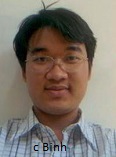 Binh Nguyen received his PhD in Organic Chemistry from the University of Maine (Le Mans, 2008) under the direction of Drs. Gilles Dujardin, Arnaud Martel and Professor Robert Dhal. During his thesis, he studied the 1,3-dipolar cycloaddition reaction of glycinate and aspartate nitrones with alkenes. He then went on a post-doctoral stay in Gif-sur-Yvette in the team of Dr. Françoise Guéritte at the Institut de Chimie des Substances Naturelles where he worked on the synthesis of flavonoidal alkaloids and the enantioselective reduction of imines into amines catalyzed by chiral phosphoric acids. Since October 2011, he worked with Dr. Ali Al-Mourabit as a CNRS Researcher in the same Institute. He received the Habiliation à Diriger des Recherches Degree in November 2015. His research focuses on the development of new synthetic methods using elemental sulfur and Fe/S catalysts.
Binh Nguyen received his PhD in Organic Chemistry from the University of Maine (Le Mans, 2008) under the direction of Drs. Gilles Dujardin, Arnaud Martel and Professor Robert Dhal. During his thesis, he studied the 1,3-dipolar cycloaddition reaction of glycinate and aspartate nitrones with alkenes. He then went on a post-doctoral stay in Gif-sur-Yvette in the team of Dr. Françoise Guéritte at the Institut de Chimie des Substances Naturelles where he worked on the synthesis of flavonoidal alkaloids and the enantioselective reduction of imines into amines catalyzed by chiral phosphoric acids. Since October 2011, he worked with Dr. Ali Al-Mourabit as a CNRS Researcher in the same Institute. He received the Habiliation à Diriger des Recherches Degree in November 2015. His research focuses on the development of new synthetic methods using elemental sulfur and Fe/S catalysts.
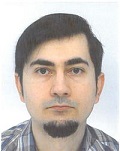 Andrei Corbu obtained his Ph.D. from Ecole Polytechnique in 2008, working under the guidance of Dr. Siméon Arseniyadis at ICSN. After a postoctoral stint with Professor K.C. Nicolaou at The Scripps Research Institute, La Jolla, USA, he was appointed CNRS researcher in the group of Professor Janine Cossy (ESPCI, Paris) in 2010. In september 2017, Andrei came back to ICSN to start a research program in the total synthesis of natural meroterpenes. He aims to employ complex biosynthetic steps, in order to streamline the total synthesis of the targets.
Andrei Corbu obtained his Ph.D. from Ecole Polytechnique in 2008, working under the guidance of Dr. Siméon Arseniyadis at ICSN. After a postoctoral stint with Professor K.C. Nicolaou at The Scripps Research Institute, La Jolla, USA, he was appointed CNRS researcher in the group of Professor Janine Cossy (ESPCI, Paris) in 2010. In september 2017, Andrei came back to ICSN to start a research program in the total synthesis of natural meroterpenes. He aims to employ complex biosynthetic steps, in order to streamline the total synthesis of the targets.
 Aurélie Claraz received her Ph.D degree in organic chemic chemistry in 2012 at Rouen (INSA) under the guidance of Dr Vincent Levacher. She joined the group of Pr Petri Pihko at the University of Jyväskylä in Finland from 2013 to 2015 as a postdoctoral fellow. She then held a temporary assistant lecturer position in an engineering school in Paris (Chimie ParisTech) working with Dr Sylvain Darses. After a second postdoctoral position in the group of Pr Janine Cossy (ESPCI Paris), she was appointed at the CNRS as research associate in the group of Dr Géraldine Masson (ICSN) in November 2017. Her research interests lie mainly in the field of asymmetric catalysis with a special emphasis on organocatalyst design.
Aurélie Claraz received her Ph.D degree in organic chemic chemistry in 2012 at Rouen (INSA) under the guidance of Dr Vincent Levacher. She joined the group of Pr Petri Pihko at the University of Jyväskylä in Finland from 2013 to 2015 as a postdoctoral fellow. She then held a temporary assistant lecturer position in an engineering school in Paris (Chimie ParisTech) working with Dr Sylvain Darses. After a second postdoctoral position in the group of Pr Janine Cossy (ESPCI Paris), she was appointed at the CNRS as research associate in the group of Dr Géraldine Masson (ICSN) in November 2017. Her research interests lie mainly in the field of asymmetric catalysis with a special emphasis on organocatalyst design.
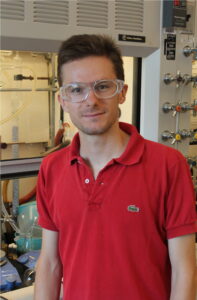 Tanguy Saget studied chemistry in Montpellier (ENSCM, 2005-2009) where he obtained a master degree after several internships in both industry and academia (Sanofi, Actelion, group of Prof. Jean-Marc Campagne à ENSCM and group of Prof. Jérôme Waser @ EPFL). After that, he started a PhD in organic chemistry at ETH Zurich working on enantioselective C-H activation with Prof. Nicolai Cramer and graduated in 2014. He then joined the group of Prof. Barry Trost at Stanford University as a Swiss National Science Foundation postdoctoral fellow. There, he developed several enantioselective Mannich reactions using bimetallic catalysis. He came back to France to get trained in organocatalysis with Prof. Jean Rodriguez and Dr. Xavier Bugaut at Aix-Marseille University. He then carried out a third postdoctoral stay as a Marie Skłodowska-Curie research fellow at Regensburg University where he worked on photocatalysis in the group of Prof. Burkhard König. In 2020, he joined the ICSN as a CNRS researcher to work on the development of catalytic and selective C-H functionalization reactions. In his spare time, he enjoys hiking (preferably in the mountains) and running in the beautiful vallée de Chevreuse.
Tanguy Saget studied chemistry in Montpellier (ENSCM, 2005-2009) where he obtained a master degree after several internships in both industry and academia (Sanofi, Actelion, group of Prof. Jean-Marc Campagne à ENSCM and group of Prof. Jérôme Waser @ EPFL). After that, he started a PhD in organic chemistry at ETH Zurich working on enantioselective C-H activation with Prof. Nicolai Cramer and graduated in 2014. He then joined the group of Prof. Barry Trost at Stanford University as a Swiss National Science Foundation postdoctoral fellow. There, he developed several enantioselective Mannich reactions using bimetallic catalysis. He came back to France to get trained in organocatalysis with Prof. Jean Rodriguez and Dr. Xavier Bugaut at Aix-Marseille University. He then carried out a third postdoctoral stay as a Marie Skłodowska-Curie research fellow at Regensburg University where he worked on photocatalysis in the group of Prof. Burkhard König. In 2020, he joined the ICSN as a CNRS researcher to work on the development of catalytic and selective C-H functionalization reactions. In his spare time, he enjoys hiking (preferably in the mountains) and running in the beautiful vallée de Chevreuse.
Coordonnateur : Géraldine MASSON
Department research topics


